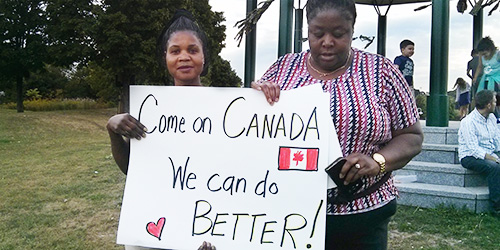In its 2017 Strategic Plan HCLC committed to achieving inclusive justice for all communities in Hamilton. We are doing this through advancing the organization’s decolonization, advocating for marginalized communities, recognizing particular struggles of intersectional oppression and building strong relationships with advocacy groups, institutions and partners.
We have embarked on a journey to develop and implement a robust Anti-Racism Anti-Oppression (ARAO) Plan. This will be the framework for all decision-making, service delivery, community engagement, policy development and human resources. We are committed to advocating for systemic and structural change at all levels of society to end inequities, power imbalances and entrenched dominance.
In 2019 we engaged a consultant to assist the Clinic with this ARAO process. The work consisted of a review of all practices, policies and processes. Input was obtained from service users, staff, board members and community partners.
We are grateful to community partners for participating in key informant interviews and/or focus groups and providing invaluable input to support this work. We look forward to continuing this conversation to facilitate improved public policy, service advocacy and collaborative planning.

Christi Belcourt and Isaac Murdoch: Serpents & Thunderbirds
Anti-Racism Anti-Oppression Policy
(Published December 2021)
| Policy type: |
Governance |
| Date first passed: |
Jan 2021 |
| Review/Amendment dates: |
|
| Next scheduled review: |
Jan 2024 |
|
|
1. Purpose
The purpose of this policy is:
- To embrace, support, and advance anti-racism anti-oppression values and attitudes and to develop anti-racism anti-oppression knowledge and practices within the Clinic, among the Board, members of staff, volunteers, placement students, members, associates, and contractors and anyone who does work at, for or on behalf of the organization and to support the efforts of the Clinic in meeting our commitments regarding the elimination of racism and other oppressions in the organization’s external work and internal systems.
- To ensure formal support for the Clinic’s ARAO Strategy and plan, especially in areas of implementation and monitoring of policies, programming, community relations, advocacy and public policy, human resources, promoting braver spaces, and leadership accountability at all levels of the Clinic.
- To provide a framework for the Clinic to effectively foster an environment that supports continuous improvement through increased personal self-reflection and awareness.
- To consistently promote new ARAO learning and capacity-building facilitated through feedback, conflict mediation and resolution, training, and on-going dialogue.
- To create a healthy and respectful environment by ensuring consistency with the principles, aims and objectives of the Canadian Charter of Rights and Freedoms, the Ontario Human Rights Code, related violence prevention policies under the Occupational Health & Safety Act, evolving Human Rights case law, the Accessibility for Ontarians with Disabilities Act, Employment Standards and other relevant labour statutes and with the Clinic’s mission and core values.
2. Statement
The Clinic is committed to ensuring full access, fairness and equity within our organization’s systems, structures, programs, and practices for all our stakeholders.
The Clinic aims to ensure that all members of staff, volunteers, students, members, community partners, allies, contractors, and visitors can work, volunteer, and access programs in an environment that is free from racism and all other forms of oppression.
The first step in addressing racism and other oppressions at the Clinic is to develop consistent leadership commitments and clear action and to work actively to eliminate inequitable barriers and all forms of discrimination for all stakeholders.
This begins with:
- Valuing and recognizing the social, cultural, racial, sexual, religious, gender and linguistic diversity of HCLC stakeholders.
- Recognizing, acknowledging, and critically engaging the issues of racism and other oppressions that create lack of access, equity and participation for traditionally marginalized communities that include our stakeholders.
- Recognizing and acknowledging that these issues stem from the pervasive ways in which forms of oppression are systemically embedded in the dominant culture and social institutions of Hamilton and Canadian society, creating a legacy of systemic power and privilege for specific groups at the expense of others.
- Understanding that as multi-dimensional individuals, human beings are not single-issue identities. Stakeholders are an intersection of various identities and therefore can experience intersectional oppression that cannot be addressed in isolation. Any struggle or effort against oppression must recognize and address the complex interlocking of these oppressions.
- Recognizing that oppressive acts and mechanisms within the Clinic can prevent our stakeholders from engaging in ways that fully reflect their abilities, experiences, and contributions. We recognize that such barriers can limit not only their contributions, but also their potential to engage within HCLC at all levels, particularly at the levels of leadership and decision-making.
- Utilising an asset-based approach in engaging members of marginalized groups in Hamilton as active, capable, experienced agents of change–not as passive recipients of “help” from professionals.
- Actively providing leadership at the board and staff levels that commits to addressing and dismantling racism and oppression across all areas of the Clinic through a strategic approach that builds on the strengths and skills of Clinic stakeholders. These actions are timely, resourced, and supported and evaluated for impact and positive outcomes.
3. Commitment
The Clinic is committed to:
- Combating oppression that prevents individuals who are low-income, female, racialized, Indigenous, Two Spirit and LGBTQ+, refugees, immigrants and other marginalized groups from participating fully in Canadian society in and through our legal and programming work, so that their rights are recognized and protected;
- Identifying and challenging inequity within the legal system, criminal justice sector, and other related sectors;
- Providing leadership through our advocacy and programming in the identification and elimination of systemic barriers embedded within systems that have a disproportionate impact on these marginalized populations in Hamilton and beyond;
- A purposeful integrated anti-racist anti-oppression approach that is critically informed by an intersectional analysis and understanding of the impact and experience of members of marginalized populations on the basis of Indigeneity, race, gender, disability, sexual orientation, first language and socio-economic class among other personal characteristics to ensure addressing related issues;
- As an employer and service provider not tolerating and proactively addressing any intentional or unintentional acts of oppression towards an individual or a group of people that creates barriers to access or participation on the basis of personal or group characteristics including but not limited to the legally protected grounds;
- Examining and continuously improving all our interactions, practices, policies, protocols and programs on an ongoing basis, to ensure compliance with this policy, that we are consistently accountable to being accessible and barrier-free and that the communities that we represent and members of our organization see themselves valued and reflected within the Clinic;
- Ensuring that our mission, operations, structure, policy and systems – programs, membership, employment, board membership and volunteer opportunities – reflect, embrace and are completely accessible to the diversity of our stakeholder communities in Hamilton and beyond;
- Ensuring equitable opportunities for diverse stakeholders to participate at all levels of the Clinic, including leadership and decision making;
- Implementing, maintaining, and monitoring procedures for dealing with incidents of harassment or discriminatory behaviour;
- Supporting other work including networks, coalitions, and community initiatives that are committed to the elimination of racism and oppression including solidarity with members of the Indigenous community;
- Proactively engaging in anti-racism anti-oppression training for our Board, members of staff, volunteers, and members.
4. Scope
This policy applies to all members of the Clinic community, which includes all members of staff, board members, volunteers, students, contractors (including vendors and suppliers), members, visitors, community partners, and any other associates.
This policy applies to all activities which take place at the Clinic offices, as well as to Clinic-related activities which occur elsewhere, including but not limited to business undertakings, teaching or training programs, research initiatives, community and outreach projects, partnership activities, social functions, fundraising events, and activities involving access to the organization’s computer or communications systems.
This policy is aligned and consistent with the Clinic’s Employment and Workplace Equity Policy, Anti-Harassment/Anti-Sexual Harassment/Anti-Discrimination Policy, Code of Ethical Conduct, and all other related Clinic policies.
All contractual relationships between the Clinic and its business, research, and community partners are governed by this policy. All such contracts and agreements will include a provision acknowledging this policy and, to the extent possible, compliance with it.


